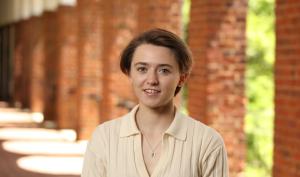
Activities at UVA: Research and club rugby
Q: Looking back to the time when you applied to UVA Engineering, why did you choose this school?
A: I chose UVA Engineering because I wanted to keep as many options available to me as possible. Unlike other programs, UVA Engineering allowed me a whole year to figure out which type of engineering I was most passionate about.
After your time here, how are you different now – how have you grown as a person?
One core class in mechanical engineering is the Strength of Materials class where students learn how different loads and loading orientations can impact a material like a beam or shaft. A key aspect of this course is the stress-strain plot, which shows the relationship between the applied load and the deformation of the material. Professor Smith, the head of the mechanical engineering undergraduate curriculum who teaches our laboratory progression, has often described our education in relation to this curve. There is a point in most materials called a yield strength. If it is pushed past this point, it will continue to get stronger and stronger in a process called work hardening. Looking back at these past four years, I can really appreciate this analogy. Mechanical engineering and its rigorous curriculum pushed me further than I thought was possible and it has made me a stronger person.
What was your favorite or most memorable educational experience at UVA Engineering, and why? Was there someone who helped you along your journey?
My favorite educational experience at UVA Engineering was performing summer research through the MAE Department’s Undergraduate Summer Research Program. Through the program, I was able to apply the knowledge I had gained in my classes to build a liquid fuel pre-vaporizer that could then be used in experiments to determine the products of diesel fuel under different combustion conditions. I found this work to be so rewarding because it gave me the opportunity to practice problem solving in the realest sense - in research, the whole point is that no one has done what you are trying to do before and so you must figure it out to the best of your ability using knowledge from classes, patient graduate students and professors. What also made this experience so impactful for me was the mentorship I received from professor (Chloe) Dedic. Working with professor Dedic was intellectually rewarding as she would work through and discuss different problem-solving approaches with me. The open dialogue we had around the problems I encountered during my research sharpened my analytical skills and gave me the confidence to take on even more responsibilities and challenges.
What’s next for you?
I will be moving to D.C. and joining Boston Consulting Group!
What positive impact do you hope to make in the future? Is there a big societal challenge you’d like to help solve?
I want to help make this planet a greener place. For the world to avoid catastrophic climate change, engineers will need to develop innovative sustainable technologies that can be adopted quickly by consumers. I hope to be involved not only in the development, but the proliferation of, these future technologies.
How has UVA Engineering prepared you for your future, for following your dreams or personal mission?
I feel like UVA Engineering’s curriculum has made me a well-rounded problem solver: I can not only find the technical solution to a problem, but I can appreciate the social, political, and cultural implications of said solution. I think the best way to put this, is that I feel like I can answer the question “So what?” I will leave UVA being able to perform some pretty impressive calculations, but more importantly I will leave with an understanding of what those numbers mean and the means to communicate that to people from non-engineering backgrounds.
What advice would you give to UVA engineering students who are just starting out?
I would give first-year engineers the same advice I received as a first year in professor Keith Williams' intro to engineering class: Drop into 2000 and 3000 level classes of different engineering majors. At first, I found the major-picking process confusing and stressful, but after sitting in a couple of classes and seeing the types of classes I was going to take in the coming years, it was clear which major I was truly excited about.